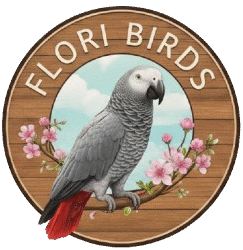African Grey parrots are renowned for their intelligence, affectionate nature, and striking beauty. Known as one of the smartest bird species, they are capable of learning hundreds of words, understanding routines, and forming strong bonds with their human families. If you’re considering adopting an African Grey or already have one, this guide will provide everything you need to ensure your feathered friend thrives in an American home.
Understanding African Grey Parrots
African Grey parrots are medium-sized, with a sleek gray plumage and bright red tail feathers. They are highly intelligent, social, and sensitive creatures. In the wild, they live in complex social groups, and this social instinct carries over into domestic life. Proper care is crucial to avoid behavioral issues, stress, and health problems.
Key Traits of African Grey Parrots:
-
Highly intelligent: Can mimic human speech, solve puzzles, and learn routines.
-
Social and affectionate: Require attention and interaction daily.
-
Sensitive: Can experience stress or behavioral issues if neglected.
-
Long lifespan: Can live 50–60 years with proper care.
Preparing Your Home
Before bringing an African Grey parrot home, preparation is essential. These birds are active, inquisitive, and require a safe and stimulating environment.
Cage and Habitat:
-
Choose a large cage with room for flying and climbing. Minimum size: 36” x 24” x 48”.
-
Include perches of varying thickness and natural materials to exercise their feet.
-
Provide toys that encourage chewing, problem-solving, and play.
-
Place the cage in a well-lit, ventilated area away from drafts, kitchens, or loud appliances.
Safety Considerations:
-
Remove toxic plants, fumes, or small objects they could ingest.
-
Avoid non-stick cookware near the parrot as fumes can be fatal.
-
Ensure windows and doors are secure to prevent escapes.
Nutrition and Diet
A balanced diet is critical for health, longevity, and mental well-being. African Grey parrots are prone to malnutrition if fed improperly.
Core Diet Components:
-
Pellets: High-quality formulated pellets should make up 60–70% of their diet.
-
Fresh Fruits and Vegetables: Offer a variety of produce daily, including carrots, broccoli, apples, and berries.
-
Grains and Legumes: Brown rice, oats, lentils, and beans provide protein and energy.
-
Occasional Treats: Nuts and seeds in moderation. Avoid overfeeding as this can lead to obesity.
Foods to Avoid:
-
Chocolate, caffeine, alcohol, avocado, and high-fat or salty human foods.
Socialization and Mental Stimulation
African Grey parrots thrive on social interaction and mental stimulation. Without it, they can develop stress behaviors like feather plucking or screaming.
Tips for Interaction:
-
Spend at least 2–3 hours daily engaging with your parrot.
-
Use puzzle toys, foraging toys, and training sessions to challenge their intellect.
-
Teach words and phrases gradually—these parrots learn best through repetition and patience.
-
Allow supervised out-of-cage time for exercise and exploration.
Grooming Essentials
Proper grooming ensures hygiene, comfort, and well-being:
-
Nail Trimming: Prevents overgrowth and injury.
-
Beak Maintenance: Keep your parrot’s beak healthy with chew toys and proper diet.
-
Feather Care: Regular preening is essential; you may assist gently if needed.
-
Bathing: Offer shallow water dishes or gentle misting to maintain feather health.
Health and Veterinary Care
Regular veterinary checkups are vital. African Grey parrots are prone to certain health issues, including:
-
Psittacosis (Parrot Fever)
-
Respiratory infections
-
Feather disorders
-
Vitamin deficiencies
Preventive Care:
-
Schedule annual wellness exams with an avian veterinarian.
-
Maintain a clean cage and proper diet.
-
Monitor for behavioral changes, appetite loss, or unusual droppings.
Behavioral Considerations
African Grey parrots are intelligent but sensitive. Understanding their behavior is key to a happy, harmonious relationship.
Common Behaviors:
-
Mimicking: A sign of intelligence and social bonding.
-
Screaming: Can indicate boredom, stress, or desire for attention.
-
Feather Plucking: Usually a sign of stress, boredom, or illness.
Behavioral Tips:
-
Establish consistent routines.
-
Avoid sudden loud noises or chaotic environments.
-
Provide mental stimulation and positive reinforcement training.
Parrot Boarding and Home Care
When traveling or needing temporary care:
-
Pet Boarding: Choose facilities specializing in African Grey parrots with safe cages, enrichment toys, and attentive staff.
-
Home Delivery and Relocation: Ensure birds are transported in climate-controlled, secure carriers with gentle handling to minimize stress.
Bonding and Lifelong Companionship
African Grey parrots are not just pets—they are lifelong companions. With proper care, they form deep emotional bonds with their owners. Patience, love, and commitment are essential.
Tips for Bonding:
-
Speak softly and interact daily.
-
Respect their social needs and individual personality.
-
Gradually introduce new experiences to reduce stress.
Caring for an African Grey parrot in an American home requires commitment, knowledge, and love. These intelligent birds bring joy, companionship, and endless fascination—but they also require attention, proper nutrition, mental stimulation, and regular health care. With preparation and dedication, your African Grey can live a long, happy, and healthy life, becoming a cherished member of your family.
For more guidance, expert care, and services including grooming, veterinary support, boarding, and safe home delivery, visit Flori Birds or contact us via info@floribird.store or WhatsApp: +1 872-384-9330.






